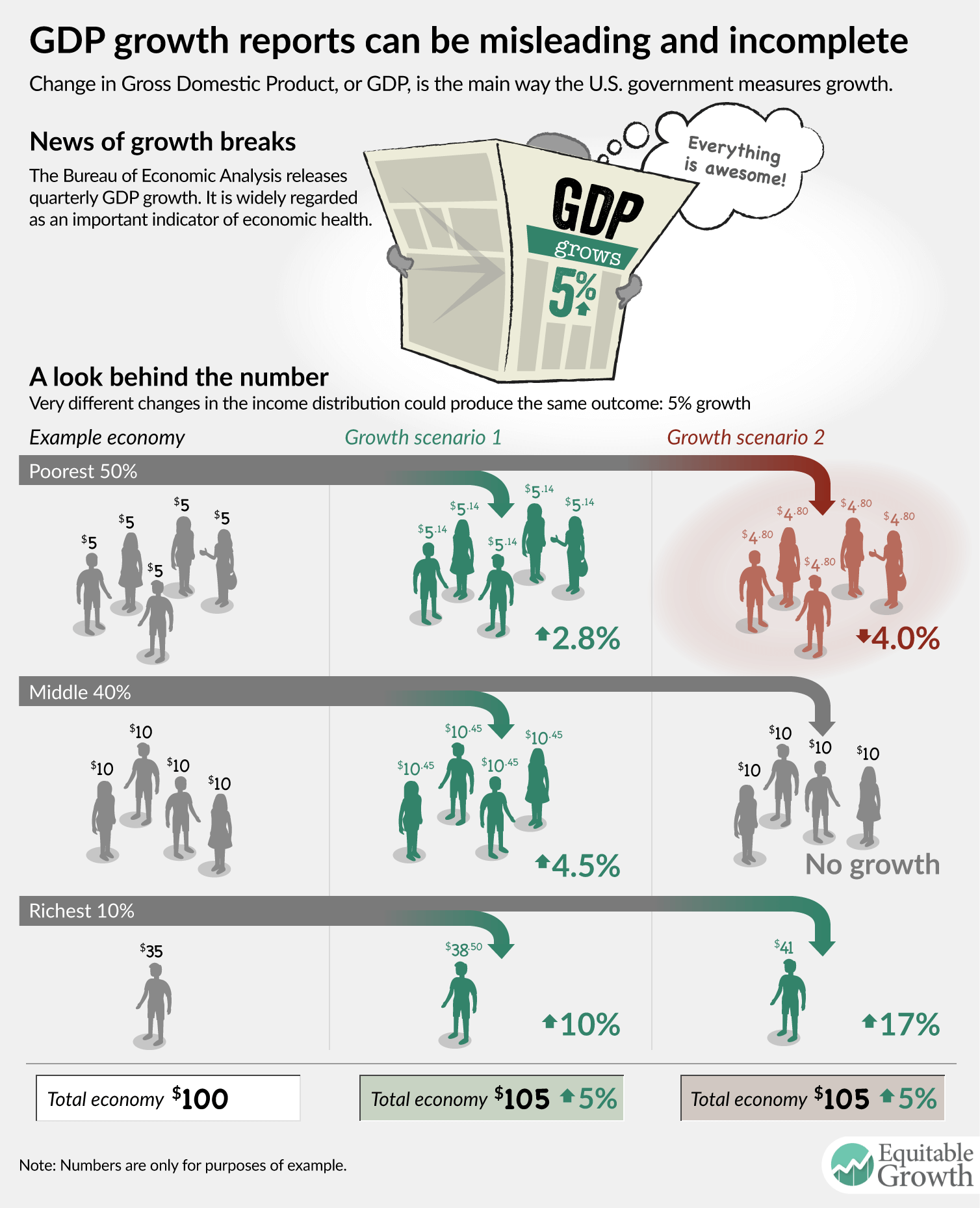Weekend reading: “Metrics that matter for workers” edition
Equitable Growth round-up
Equitable Growth this week released a new factsheet breaking down how gross GDP statistics obscure other metrics that better track the ways growth affects Americans’ standards of living up and down the income ladder. In addition to recommending that a distributional component be incorporated into the National Income and Product Accounts collected by the federal government, this factsheet assembles Equitable Growth’s various research products on “disaggregating growth,” including Heather Boushey and Austin Clemens’ recent report on the topic.
Kate Bahn wrote a column this week reflecting on the recent Freedom & Justice Conference jointly hosted by the National Economic Association and the American Society of Hispanic Economists at Salish Kootenai College. The conference elevated contemporary research on economic challenges and opportunities facing Native American communities. In addition to reviewing several recent research papers in this field, Kate concludes with recommendations for policymakers for improving economic data collection on Native American communities.
In his weekly “worthy reads” column, Brad Delong highlights the work of our new wages lead economist Kate Bahn as well as a blog on U.S. wage growth by Equitable Growth alumnus Nick Bunker. Brad also summarizes recent research papers in macroeconomics, including work on optimal taxation by University of California, Berkeley economist and Equitable Growth steering committee member Emmanuel Saez and Harvard University economist and Equitable Growth grantee Stefanie Stantcheva as well as papers on tax evasion by UC-Berkeley economist and frequent Equitable Growth guest author Gabriel Zucman.
Capping off the week, we launched “Competitive Edge,” our new blog focused on antitrust enforcement, with Yale University economist Fiona Scott Morton’s inaugural post. In addition to introducing the aims of this new initiative, Professor Scott Morton discusses some of the avenues for reinvigorated antitrust enforcement, grounded in economic theory and legal precedent, that were highlighted by a recent volume of The Yale Law Journal. This volume brought together papers by top antitrust scholars from a conference last fall co-hosted by Equitable Growth and the American University Washington College of Law.
Links from around the web
Reflecting on the current state of the job market, Patricia Cohen points out that wages remain stagnant despite soaring corporate profits and almost eight years of consistent job growth. As this state of affairs stands in contrast to the heightened wage pressure typically expected from low unemployment numbers, Equitable Growth’s researchers have emphasized the role of monopsony—the labor market condition in which a small number of employers boast disproportionate power to set low wages without having to compete for workers. [nyt]
Jared Bernstein, a senior fellow at the Center on Budget and Policy Priorities, delves into other causes of persistent wage stagnation. In particular, Bernstein points to inflation risks from a potential trade war, interest rate risks from the Federal Reserve’s expected monetary policy, and legal and policy decisions driving declining worker power vis-à-vis employers. [nyt]
Chandra Bozelko and Ryan Lo illustrate another widespread problem created by skewed power within labor markets: employment discrimination, in this case against formerly incarcerated workers. Despite evidence that ex-offenders are no more likely to be fired than other workers and that these workers are in many cases more productive than other workers, this population of Americans has an unemployment rate of 27 percent—higher than the total U.S. unemployment rate during the Great Recession—largely due to pervasive stereotypes among employers. [nbc news]
Unfounded sex stereotypes also persist in the contemporary U.S. labor market with negative consequences for women’s wages—consequences that in one case were challenged in court with facts and data. Tyler Pager details how nurses in New York state received a $20.8 million settlement after filing a lawsuit against the state for its exclusion of nurses from its male-dominated list of physically taxing jobs entitled to a wage premium. This case is consistent with Equitable Growth research demonstrating that wage penalties for female-dominated occupations are widespread and without basis in objective productivity levels. [nyt]
Claire Cain Miller summarizes recent research verifying that sex stereotypes persist in the home as well. Indeed, a new study by U.S. Census Bureau economist and Equitable Growth grantee Marta Murray-Close and her colleague Misty L. Heggeness comparing Census Bureau data with IRS tax returns finds that gender norms influence women and men’s self-reporting of their incomes. Notably, in heterosexual couples in which the woman earns more than her husband, the IRS data show that women report incomes 1.5 percentage points less than their true incomes whereas men report incomes 2.9 percentages points greater than their true level. [nyt]
Friday figure

Figure is from Equitable Growth’s, “Measuring U.S. economic growth.”

